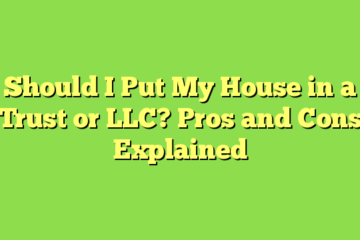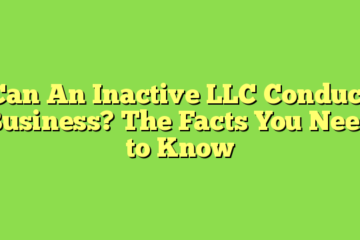As an entrepreneur or business owner, you may have started with a limited liability company (LLC) structure for your venture. However, as your goals and objectives evolve, you might find that transitioning to a nonprofit organization aligns better with your mission and values.
Converting an LLC to a nonprofit can be a complex process, but with the right knowledge and guidance, it’s certainly achievable. In this blog post, we’ll explore the steps involved, the benefits, and the considerations to keep in mind when making this transition.
Why Convert an LLC to a Nonprofit?
Before delving into the specifics of the conversion process, it’s essential to understand the reasons behind such a decision. Some common motivations for converting an LLC to a nonprofit include:
Pursuing a Charitable or Social Mission
If your business aims to serve a greater good, such as education, scientific research, or community development, transitioning to a nonprofit structure can better align your operations with your mission.
Fundraising and Grants
Nonprofits have the ability to raise funds through donations, grants, and other charitable contributions, which can provide a more sustainable financial model for organizations focused on social causes.
Tax Exemptions
Nonprofit organizations that qualify for 501(c)(3) status can enjoy significant tax benefits, including exemption from federal income taxes and the ability to receive tax-deductible contributions.
Limited Liability Protection
Similar to LLCs, nonprofit corporations offer personal liability protection for their directors, officers, and members, shielding their personal assets from potential legal liabilities.
Legacy and Longevity: Nonprofits can be passed down to future generations, ensuring the continuation of your mission and impact for years to come.
Steps to Convert an LLC to a Nonprofit
Converting an LLC to a nonprofit is a multistep process that requires careful planning and execution. Here are the key steps involved:
1. Determine Eligibility
Before proceeding with the conversion, you need to determine if your LLC is eligible to become a nonprofit organization. The Internal Revenue Service (IRS) has specific criteria for granting tax-exempt status under Section 501(c)(3) of the Internal Revenue Code. Generally, your organization must have a charitable, educational, scientific, religious, or literary purpose, and none of its earnings can benefit private interests.
2. Convert to a Corporation
In most states, you cannot directly convert an LLC to a nonprofit organization. Instead, you’ll need to first convert your LLC to a corporation. This process typically involves filing Articles of Incorporation or Articles of Conversion with your state’s business registration agency. During this step, you’ll also need to transfer the LLC’s assets and liabilities to the new corporation.
3. Amend Articles of Incorporation
Once you’ve converted to a corporation, you’ll need to amend your Articles of Incorporation to include specific language required by the IRS for nonprofit organizations. This includes statements about your organization’s charitable purpose, provisions for distributing assets upon dissolution, and restrictions on private inurement (ensuring no individual benefits from the organization’s activities).
4. Develop Nonprofit Governance Documents
Nonprofit organizations are required to have governance documents in place, such as bylaws and conflict of interest policies. These documents outline the organization’s operational procedures, decision-making processes, and guidelines for managing potential conflicts of interest among board members and staff.
5. File for Tax-Exempt Status
The next critical step is to apply for tax-exempt status with the IRS. This typically involves filing Form 1023 or Form 1023-EZ, depending on the size and complexity of your organization. You’ll need to provide detailed information about your organization’s mission, activities, financial projections, and governance structure. The process can be time-consuming and may require the assistance of a legal or tax professional.
6. Obtain State-Level Recognition
In addition to federal tax-exempt status, you may need to register your nonprofit organization with your state and apply for exemption from state taxes. The requirements and processes vary from state to state, so it’s essential to consult with your state’s business registration agency or a legal professional.
Considerations and Challenges
While converting an LLC to a nonprofit can offer numerous benefits, it’s important to be aware of the potential challenges and considerations:
Loss of Control
As a nonprofit organization, you’ll need to establish a board of directors and adhere to strict governance rules. This means you may have less direct control over the organization’s operations compared to an LLC structure.
Asset Ownership
When converting to a nonprofit, the LLC’s assets will become the property of the new nonprofit organization. You will not have personal ownership or control over these assets.
Ongoing Compliance
Nonprofit organizations are subject to strict reporting and compliance requirements from both the IRS and state agencies. Failure to comply can result in penalties or the revocation of tax-exempt status.
Fundraising Challenges
While nonprofits have access to charitable contributions and grants, raising funds can be a constant challenge, especially for new organizations without an established donor base.
Legal and Professional Fees
The conversion process and ongoing compliance requirements may necessitate the involvement of legal and tax professionals, which can be costly.
Takeaway
Converting an LLC to a nonprofit organization is a significant undertaking that requires careful consideration and planning. While the process can be complex, the potential benefits, such as pursuing a charitable mission, accessing tax exemptions, and ensuring the longevity of your organization, can make it a worthwhile endeavor.
By understanding the steps involved, the potential challenges, and the importance of seeking professional guidance, you can navigate the conversion process successfully and align your organization’s structure with its goals and values.

Alfie Wilson, Esq., is a legal content writer with expertise in business formation, criminal law, veterans disability, family law, DUI law, personal injury, animal welfare, and legal writing. He holds a J.D. from Emory University School of Law and has experience in appellate advocacy and regulatory matters. Alfie’s passion lies in breaking down complex legal topics for a non-lawyer audience. He currently writes for law firms and non-profits on various issues and resides in Arlington, Virginia.









